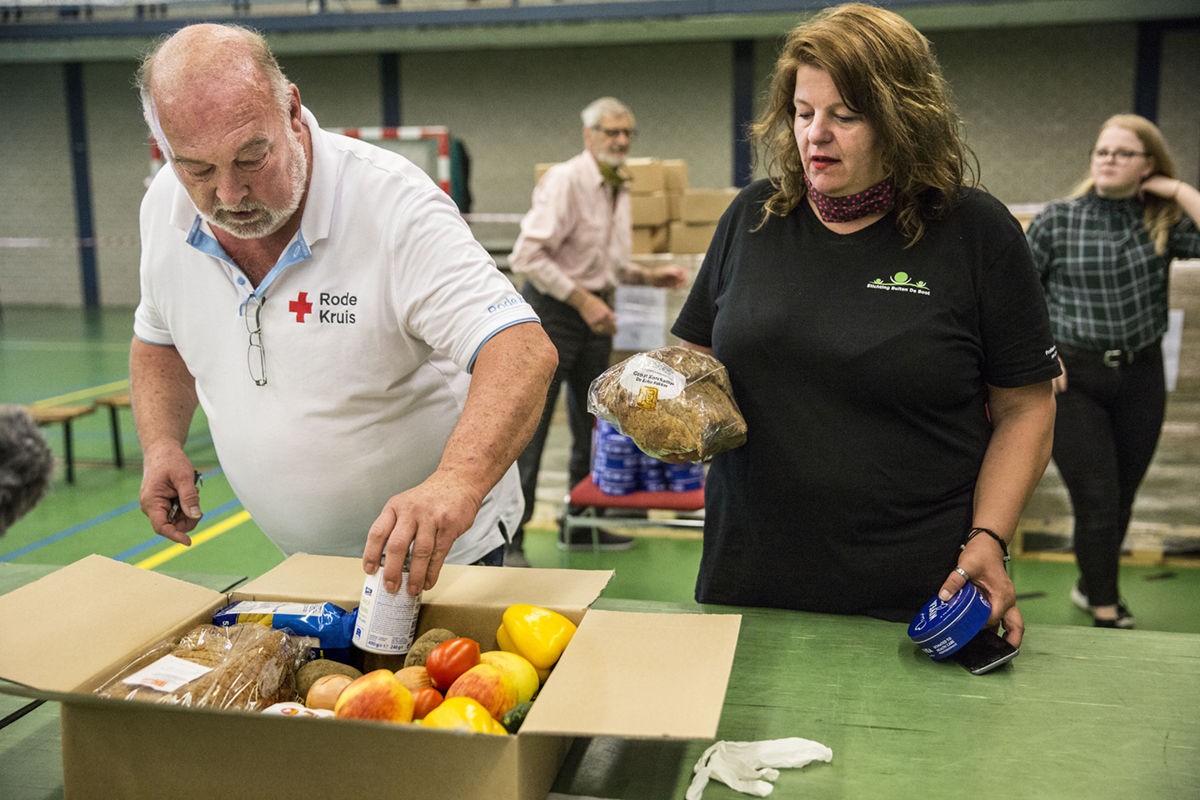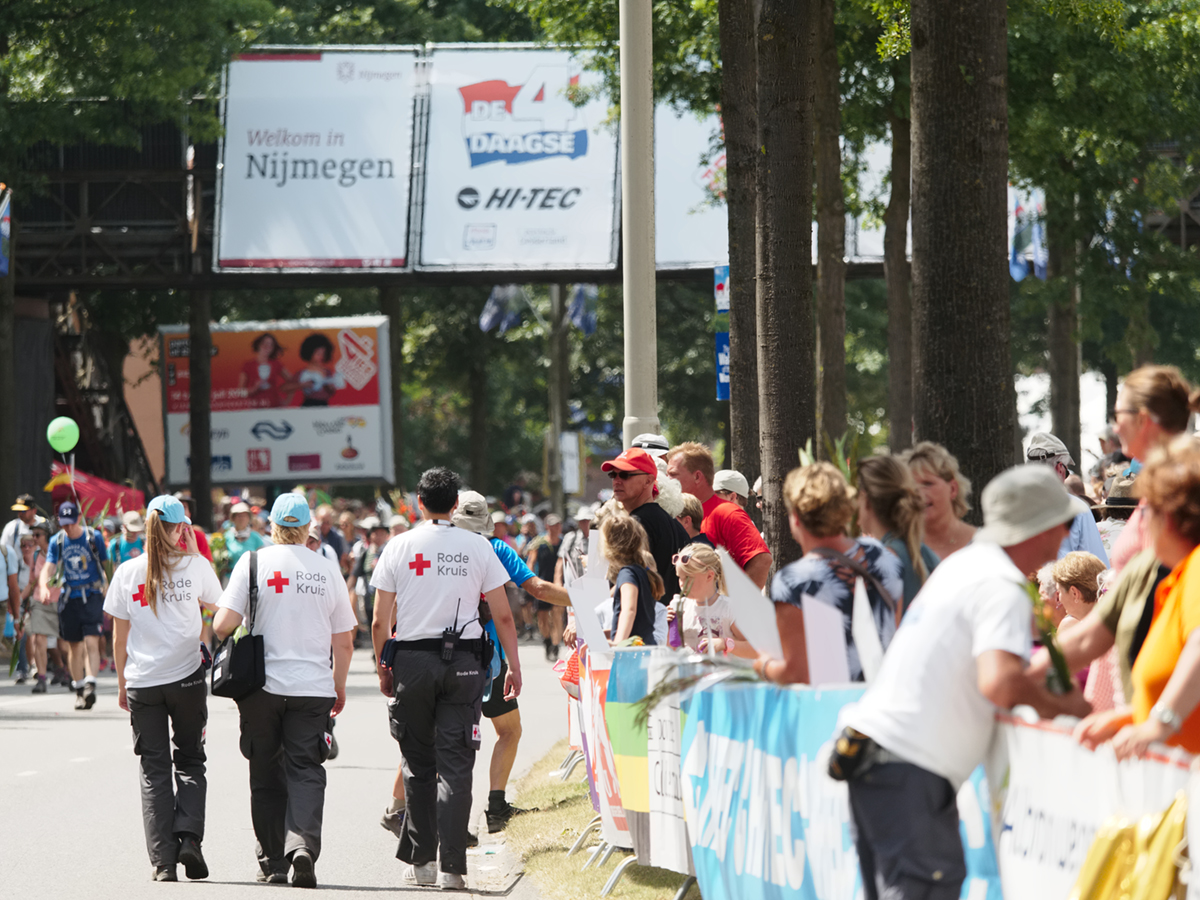Reading time 9 minutes

Volunteering
Throughout the world, the Red Cross acts in accordance with the same seven basic principles. The principle of voluntariness means that we work with people who offer their efforts voluntarily and not for personal gain. The international Red Cross movement is the biggest humanitarian network in the world and reaches 150 million people with 13.7 million volunteers. In the Netherlands, people in need can count on more than 19,000 regular volunteers and more than 90,000 Ready2Helpers.
Reading time 9 minutes
A deeper exploration of what volunteering means
In the words of Winston Churchill: 'We make a living by what we get, but we make a life by what we give.' Working selflessly for others is good for you. We take a deeper look at the basic principle of volunteering. Because - where does the need to help another person come from? And is it really selfless, or do you get something out of it?
Helping to scrub and clean up after the floods in Limburg. Delivering food parcels for people in financial need. Administering first aid during large or small events. The Red Cross is only able to be there thanks to people who volunteer to help another person. Or, to coin a phrase, to act altruistically. The term altruism was introduced in 1850 by the French sociologist Auguste Comte. It means that you do something for someone else, and not just for yourself. This was also the thought that lay behind the call of Comte's contemporary, Henry Dunant: ‘Tutti fratelli!’ (’We are all brothers!’). Dunant made this call after the battle of Solferino when he saw more than 40,000 dead and wounded lying on the battlefield and mobilised the population to help: we do this for someone else.
Happiness hormones
We help other people based on a core need to guarantee the survival of our species. Nature has programmed us in such a way that helping makes us feel good. It even releases happiness hormones, which produce the so-call ‘helper’s high’. But there are more benefits. You are important to someone else, you matter and you give your life meaning. Besides this, it takes you away from your own cares and worries for a while. A study carried out by the University of California into the long-term effects of giving, revealed that people who do voluntary work are 44% less likely to die in the next five years than people who do not. So, helping other people has a positive effect on our own mental and physical wellbeing. And finally, voluntary work looks good on your CV and is a great way to make new acquaintances.
Voluntary work has a lot to offer, but this is certainly not what every volunteer consciously thinks about. Annet Spijker, national coordinator of Volunteer policy: "I want to do something for someone else; we hear that a lot from volunteers. Offering help is something that comes naturally to them. Many people look for a way to put this into practice. With the Red Cross they can do that. As a volunteer or Ready2Helper you really can make a difference for someone else. On a one-off, occasional or regular basis."

Early middle ages
Voluntary work goes back a long way in history: from simply helping a neighbour to everyone pulling together after a disastrous fire or flood. In the early middle ages, organised voluntary work already existed, under the auspices of the church. However, unpaid work was relegated to the background during the industrial revolution. Society changed, and individualisation took over. As a result, organised help for the poor was only provided by the church or by small groups of idealists. So the idea put forward by Dunant, of establishing a large network of volunteer helpers, was revolutionary in its day at the end of the nineteenth and beginning of the twentieth century.

Explosive growth
Today it would be hard to imagine our society without voluntary work, and volunteering is one of the most important pillars of the work of the Red Cross. “However, we do see a shift taking place in the way that people offer their support for our organisation,” says Annet. “Previously, people signed up as a volunteer on their fifteenth birthday and stayed with us until their eightieth. We still have a faithful host of volunteers who commit themselves body and soul to the Red Cross on a long-term basis. But we see more and more people who want to do something, but then with a very temporary focus.

And that fits with today's society, Major crises, such as the refugee crisis in 2015, the corona crisis and more recently the flooding in Limburg and the arrival of Afghan refugees, have led in recent years to an explosive growth in the Ready2Help network. An emergency situation arises and people are keen to help: ‘call me if you need me.’ And we cherish that, too. Help on a one-off basis or a more lasting commitment; we need all the help we can get if we are to be able to guarantee our assistance to people in need.”

Motivation tour
A visit to various volunteers and Ready2Helpers makes it clear that intrinsic motivation will stand the test of time. As Rick said previously to this magazine: “The bond that you share together when you are standing there ready to help during an event is an enormous inspiration. It is a real family feeling.” And Emmy felt that her work on the corona ward of a nursing home was richly rewarding for her too. “It gives such a feeling of fulfillment. And as a volunteer you really get the time to make a difference for people.” Huib's one-off work for the homeless shelter left a lasting impression on him. “The gratitude that you get back for it is fantastic.” And the eighteen year old Sander, who has just joined the Red Cross as a volunteer, summarises it nicely "Helping; it's just what you do.”